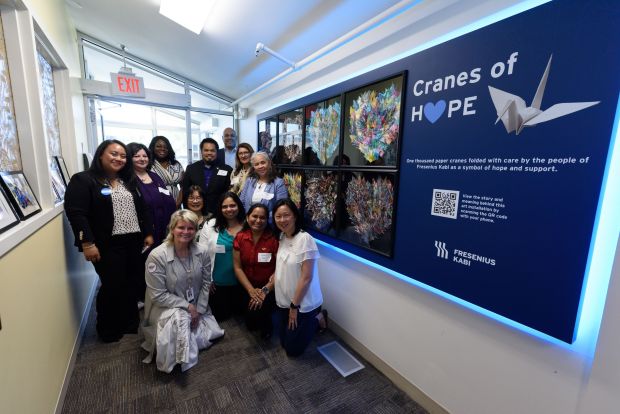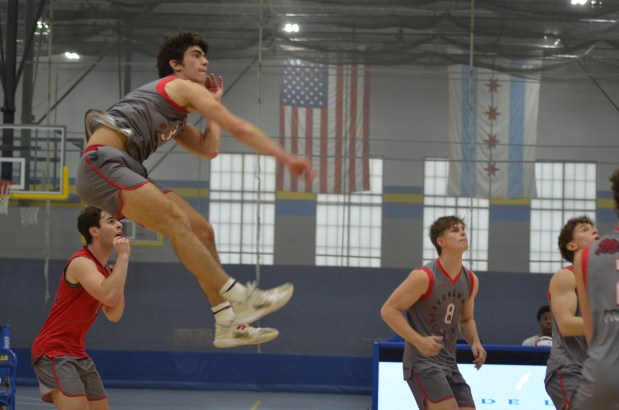Freed from the cold, clinical circumstances of her treatments, two-time cancer survivor Brigitte Powidzki found her yoga instructors “amazing” and relished a book club at Advocate Lutheran General Hospital’s Cancer Survivorship Center in Park Ridge.
So far in 2024, Powidzki has been one of more than 2,000 clients using the center, which offers cancer survivors a variety of restorative and/or practical classes and activities in a ranch-style house structure at the northwest corner of the hospital property at 1999 W. Dempster St., Park Ridge. The center also got a boost recently with the donation from Fresenius Kabi employees of 1,000 origami cranes fashioned into pieces of heart-shaped artwork.
An array of small rooms, including a wig-fitting space, enable cancer survivors to get their minds off their afflictions while toning their bodies in an atmosphere unlike the hospital settings in which they have spent so much time.
Powidzki, who lives in Chicago’s Edgebrook neighborhood near Niles, is a nurse in Lutheran General’s ambulatory care center. She was first diagnosed with Hodgkin’s lymphoma 30 years ago, then again a decade ago. She could not find a similar survivor’s center to help heal body and mind when cancer struck, and adapts a “better late than never” view in activities and connecting with other cancer patients.
“There’ a sense of community there,” Powidzki said. Participating in yoga, she appreciates instructors “who know when to push you and when not to.”
Similarly, fellow Northwest Sider Regina Szyska, diagnosed in November 2022 with stage 4 metastatic breast cancer that had spread into her bones, gets mentally transformed by at least once-a-week in-person and on-line connections with the center.
“Absolutely,” Szyska, another yoga practitioner, said. “There are days I go in there dragging my feet. But when I finish I feel like a new person. Everybody there is in the same position.”
The cancer survivorship center will mark its 11th anniversary in operation in August as the third occupant of the ranch-style building, very unlike the huge structures otherwise occupying Lutheran General’s property. Originally opened decades ago as a tuberculosis center, the building later housed an adult Down’s Syndrome facility.
Dr. Sigrin Hallmayer, an oncologist and medical director of the center, said the hospital initially had no plans for the building when the Down’s Syndrome center departed. But she was quick with the pitch for a survivorship center to top hospital administrators. “We (happily) grabbed it,” Hallmayer said.
Just a few steps away from the northwest corner of Lutheran General’s main garage, the center offers on-site and virtual classes in strength and conditioning, dressing for your new body, reflexology, water aerobics (off-site,) and art, garden and music therapy. The book club is also considered therapy.
Three types of yoga are featured: gentle yoga, chair yoga and yoga for the nervous system. Massage therapy is available. A coffee and conversation session is scheduled weekly.
One of the most popular features is the wig room. Some 100 different styles are available for patients who have lost their hair to cancer treatments. If the right wig cannot be found in stock, the center will custom-order one.
“There’s the stigma of cancer,” Hallmayer said of the desire for wigs. “They don’t want people to know they have it.”
The survivorship center has boosted treatment and recovery in an era when medical science has made progress against cancer, once perceived as a death sentence for most patients. Hallmayer said 30% of Stage 4 melanoma patients are now cured. Many challenges still remain, such as pancreatic cancer, against which immunotherapies have not been particularly successful, she said.
Overall, the atmosphere of the center is low-key and welcoming in contrast to many hospital settings. And as survivors, employees and other visitors walk in, they see a collage of colors in the origami crane artwork, a gift from the Asian American Pacific Islanders Employee Impact Group of Lake Zurich-based Fresenius Kabi, a medical equipment company.
Some 50 Fresenius Kabi employees and their families helped fold the cranes, which symbolize happiness and longevity in Japanese culture, in the traditional Japanese creation of senbazuru, or 1,000 cranes. Liz Eyas, senior project manager in the company’s medical affairs and vigilance department, directed the effort to assemble the cranes.
“In Japanese folklore, each folded crane represents one year in the crane’s life,” Eyas said. “These are well-wishes. Our intention is to serve as a symbol of hope and support.”
But the cranes in the entranceway may not be just a one-and-done effort. Eyas said discussions are ongoing about an origami class at the survivorship center and Fresenius Kabi seems amenable to lending out its crane artists to help with such a class.
“Absolutely,” center patron Szyska said when asked if she’d be interested in learning origami.
Whether folding cranes or loosening muscles and mental knots via yoga, “I’d recommend this to everybody,” she added.





